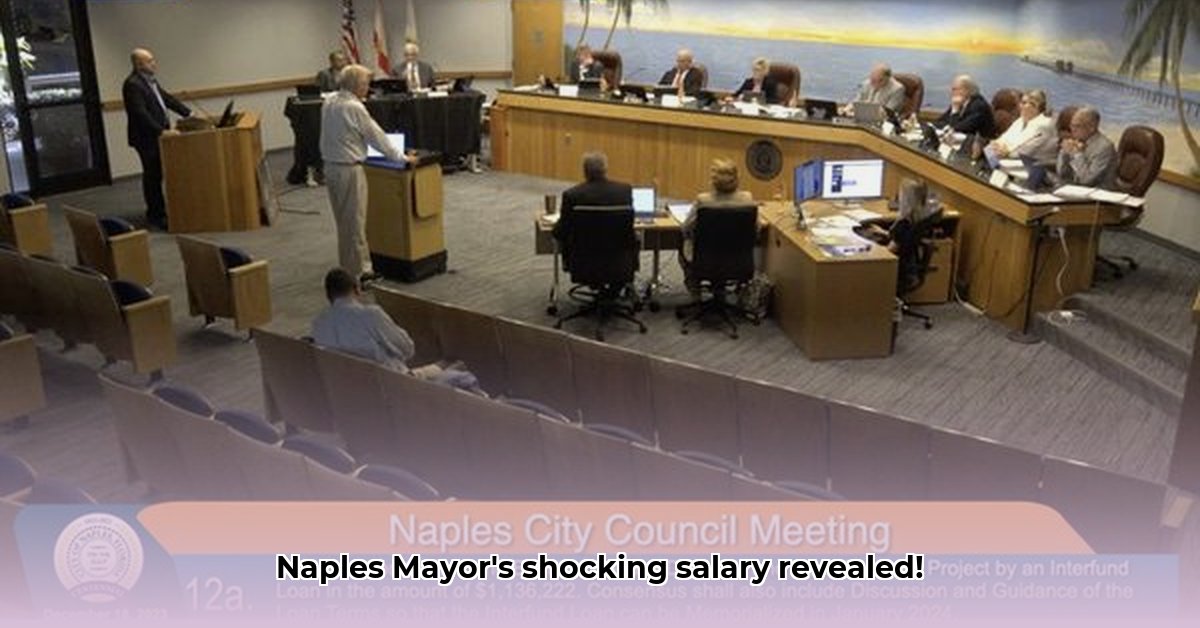
Naples Mayor Salary: A Deeper Dive into City Finances
The salary of the Naples mayor is a subject of significant public interest, reflecting broader concerns about transparency and equitable resource allocation within city government. While precise figures for the mayor's compensation remain elusive due to limitations in publicly available data, an analysis of overall city employee salaries reveals a compelling narrative. The data showcases a considerable disparity between the highest and lowest earners within the Naples municipal workforce, raising crucial questions about fairness, efficiency, and the responsible use of taxpayer funds. This article explores these issues, offering actionable recommendations for improvement.
The available data reveals a striking range in Naples city employee salaries, spanning from a low of approximately $53,000 to a high exceeding $297,000. The average salary sits around $74,000, slightly above Florida's average but below the national average. This disparity immediately raises questions. Does this reflect a genuine market-driven need for high earners in specific roles, or does it indicate potential inefficiencies or inequities within Naples' compensation system? Is the high cost of living in Naples adequately accounted for in salary structures across all employment levels? These questions highlight the need for thorough investigation.
A key challenge in this analysis is the limited availability of comparative data from similar Florida municipalities. This lack of transparency makes it difficult to definitively assess whether Naples’ salary structure, including the mayor's compensation, is aligned with market rates and best practices. Consider the analogy of assembling a puzzle with missing pieces; a complete picture remains elusive without comprehensive data from comparable cities.
Despite this limitation, the uneven salary distribution within Naples itself is striking. A significant portion of city employees earn salaries clustered at the lower end of the scale, contrasted sharply by a few exceptionally high salaries at the top. This uneven distribution raises concerns about potential imbalances and raises critical questions regarding the city's compensation practices. Is the city's budgetary allocation truly effective and equitable in its distribution across all employee levels? Are there potential cost-saving opportunities by scrutinizing these salary disparities?
Imagine a pizza – a truly fair compensation system would distribute resources evenly, like toppings on a pizza. However, the current situation in Naples resembles a pizza with an overload of toppings on one slice and meager amounts on others. This imbalance demands attention.
Actionable Recommendations & Risk Mitigation
To address the identified issues and ensure a fairer, more transparent system, several crucial steps are necessary:
Comprehensive Salary Analysis: A thorough review of the city's salary structure is paramount, comparing Naples' compensation to similar municipalities in Florida to establish meaningful benchmarks. This will enable a realistic assessment of what the city should fairly pay its employees.
Enhanced Transparency: Publicly releasing detailed salary data on a regular basis is essential. This transparency fosters accountability and builds public trust by allowing citizens to scrutinize the city's spending.
Modernized Compensation Model: Implementing a market-based compensation system that fairly reflects the skills, experience, and responsibilities of each position within each department is crucial. This will ensure competitive salaries while minimizing arbitrary increases and promoting pay equity.
Community Engagement: Open forums and public discussions about city finances are vital for building trust and shared understanding between city officials and residents. This collaborative approach to financial management empowers the community and ensures informed participation.
Let’s analyze the potential risks and mitigating strategies:
| Risk Category | Probability | Impact | Mitigation Strategy |
|---|---|---|---|
| Excessively High Salaries | Moderate | High | Implement rigorous salary benchmarking; renegotiate excessive salaries; consider performance-based pay. |
| Lack of Transparency | Low | Medium | Proactively release comprehensive salary data; host public forums; conduct regular audits. |
| Insufficient Benchmarking Data | Moderate | Medium | Collaborate with neighboring cities to gather data; engage external consultants for expertise. |
| Difficulty Retaining Talent | Moderate | High | Develop competitive benefits packages; explore strategies for employee growth and development. |
Conclusion: A Path Towards Responsible Budgeting
The available data points to potential issues in Naples' financial management, particularly concerning compensation. While conclusive comparisons with other municipalities are hampered by a lack of publicly available data, the internal salary disparities within Naples demand investigation. A commitment to comprehensive salary analysis, enhanced transparency, a modernized compensation model, and robust community engagement will be crucial in addressing these issues. Ultimately, achieving responsible, transparent, and equitable budgeting will be in the best interest of the entire Naples community. The path forward requires continuous effort, open communication, and commitment to positive change.